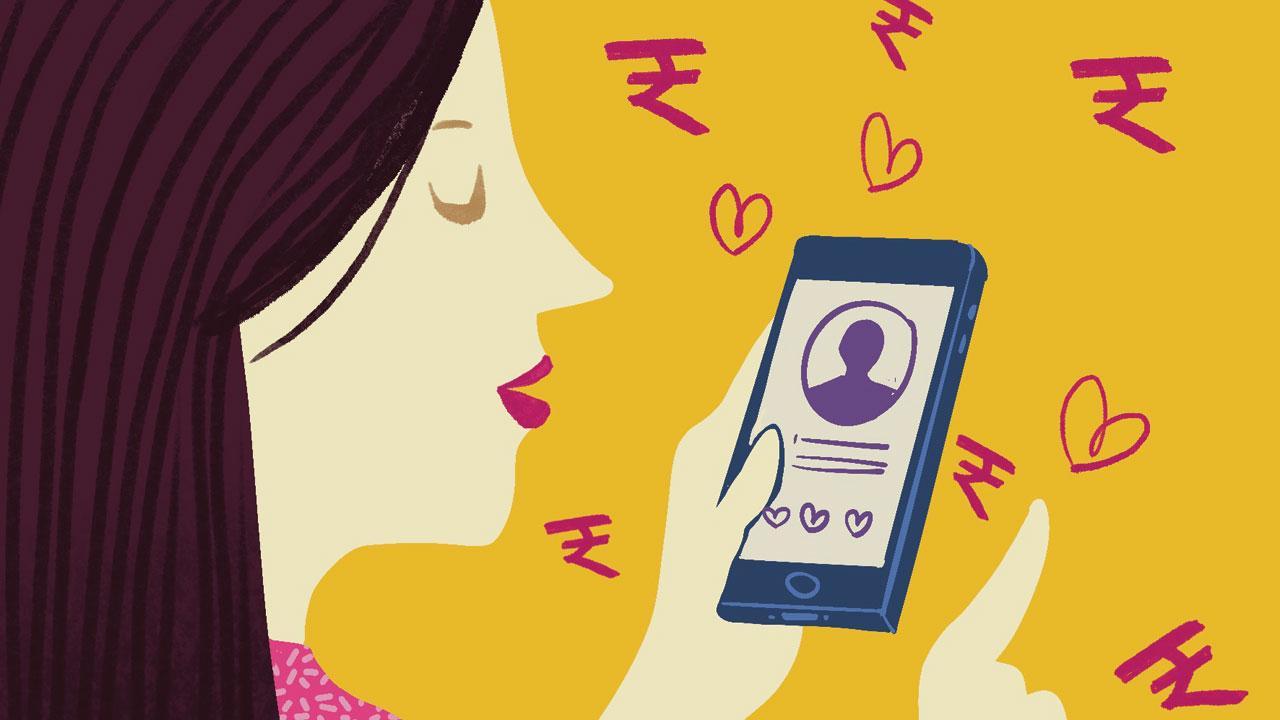“Jaanums and khanums” said the Hyderabad RJ, “the government has issued warnings—don’t give money to people you meet on dating apps.”

Illustration/Uday Mohite
![]() I heard an unexpected public service announcement on the radio last weekend.
I heard an unexpected public service announcement on the radio last weekend.
ADVERTISEMENT
“Jaanums and khanums” said the Hyderabad RJ, “the government has issued warnings—don’t give money to people you meet on dating apps.”
What brought the word dating into a government announcement? Reportedly, a woman called Surbhi Gupta swindled several Gurugram men she met via Bumble to the tune of one crore. Word is, the men, traumatised, are giving up alcohol, meat and dating apps, and turning to sanatan dharm. “I have renounced pleasure” said one.
But you don’t need dating apps to be fooled. In Japan, 39-year old Takashi Miyagawe acquired 35 girlfriends while selling hydrogen water shower heads. He told each a different date as his birthday so that he got birthday gifts all year. Not wildly expensive ones. They totalled just 100,000 yen (R56,000 rupees). Eventually, as one article dramatically wrote, “his web of lies began to dissolve like the hydrogen molecules in his therapeutic water”, perhaps because Microsoft Excel did not have a suitable formula for managing 35 parallel relationships. The women formed a “Victims Association” and went to the police. A journalist called to ask me if hook-up culture was to blame; another to ask why people were getting fooled on dating apps.
There’s more than a hint of morality here. People are told marriage will bring happiness, stability, respectability and self-esteem. It frequently brings misery, violence, drama and discoveries that a spouse is not what they seemed to be—at times even already someone else’s spouse yaniki efficient cheating. Money is extorted in marriage too in the name of tradition—dowry and other demands. People give in because we are conditioned to believe so much hinges on marriage. How come no one calls up to ask if marriage is causing social downfall? Or governments? Or the idea of a Digital India?
We pay attention when it’s a matter of money or death. But we tend to be fooled in love and sex, because not only are these areas subject to tremendous social prohibition and control, but emotional life itself is always trivialised and subjugated to the social aim of getting ahead. They become lonely, slightly shameful places—deserted inner neighbourhoods you could say—where it’s hard to be confident, easier to be preyed upon. Were these places more tended, they may be less vulnerable.
In 2009, a Mumbra man photoshopped himself into a 1945 news article standing next to Mahatma Gandhi. He told people he was Gandhi’s close associate and they believed him and gave him money to invest. The twist? The man was only 29 years old. We are also fooled because well, we are foolish and a little hopeful. We want to believe in magic, miracles, life as a movie with a happy ending in the middle itself.
Love fools all of us. We break our hearts, lose dignity, end friendships, destroy peace of mind. We have written many bitter songs and bad poems, but not yet cancelled love, for good reason. It’s the people who fool us—along with our own yearnings. Or, as Mahua Moitra wryly and rightly said of her “jilted-ex” after he tried to sell her out and kidnapped their mutual Rottweiler Henry, “I have terrible taste in men.” Never thought I’d hear a politician say something like that. Something must be changing.
Paromita Vohra is an award-winning Mumbai-based filmmaker, writer and curator working with fiction and non-fiction. Reach her at [email protected]
 Subscribe today by clicking the link and stay updated with the latest news!" Click here!
Subscribe today by clicking the link and stay updated with the latest news!" Click here!







